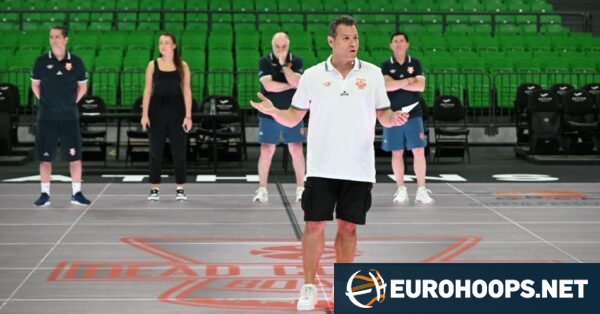By Eurohoops team/ info@eurohoops.net
The EuroLeague season starts with 20 teams, and in the end, only eight of them will be part of the playoffs.
EHCB president Dimitris Itoudis addressed this issue in an interview posted on the EuroLeague Head Coaches Board website and also expressed the coaches’ general consensus about what should be done in the future.
Here’s the full interview.
Q: What does a 20-team EuroLeague mean for a coach?
It means more obligations, more double weeks, more travel, especially for Hapoel Tel Aviv, since we play our home games in Bulgaria. As the president of the EHCB, I believe we should examine the competitive aspect of the league more closely. In the past, when we were 16 teams, eight made it to the playoffs, so that’s 50% of the teams, and it approaches the percentage of the NBA teams that are involved in the postseason.
When the league expanded to 18 teams, nothing changed in the playoffs, and as coaches, we had to put pressure on the inclusion of the play-in round. Now we are at 20 teams, and the playoffs are still an eight-team affair, pushing the percentage of teams involved to 40% and only if we add those competing in the play-in, we get back to 50%. That means that 12 out of the 20 teams will miss the playoffs, and their season will be considered bad.
I said the same things since I was a regular in the Final Fours. We talked as coaches about the play-ins, and they listened to us. We need to shape and evolve the competitive aspect a little more, either with two or more conferences. Either geographically divided or even with a draw.
We need at least 12 teams taking part in the post-season, even with an extended play-in round. Now we have six teams qualified directly for the playoffs and four more involved, with two of them also making the playoffs. In the NBA, 16 out of the 30 teams are competing in the playoffs, and if we add the play-in games, then it’s 20 out of 30, so that’s 67% of the league. We have to ask ourselves why. Is it just convenient to have eight teams involved?
I think that we may also end up with more teams in the future and full playoffs, so we need to move towards this direction every step of the way.
Q: How do coaches and teams cope with almost double the number of double-action weeks and logistic challenges?
All teams have adjusted their rosters to 16-17 players, due also to their domestic leagues. We need to have more players for rotation, that’s how things are, that’s why we expanded the roster. We anticipate injuries and fatigue. Compared to the NBA, there is a disparity in the league regulations per country, and a different system for foreign players per country. In Israel, five foreigners are allowed to register, and one Israeli player should always be on the court during league games.
In Turkey, we fought for things to change, and now seven foreigners are allowed. There is diversity in the federations and the domestic leagues, and the Euroleague is not responsible for that.
The Euroleague says we don’t care about the passport, and that’s how things should be. If not, you are asking me not to be a coach but a calculator. The rules should be the same, or at least similar. The Spanish have the “COTONOU” players, which is very smart. The domestic leagues should be inspired by a country like Spain, which has had successes with the national team and the best local league in Europe, the most competitive. So these things should be streamlined for everyone, and that includes salaries and even taxation. We are in talks with the EuroLeague about a framework agreement for coaches, and even if different countries have different taxation systems, ideally, the EuroLeague as an entity could work under European law and have the same obligations for all clubs
Q: Why do you think those issues need to be addressed sooner rather than later?
We need to discuss that as we are heading towards 22 or 24 teams in the near future. It goes without saying that we will end up in the two-group format and must discuss the entry into the playoffs of more teams. The timing is right to discuss even how the European club season will end. If the Euroleague final or the finals should be the last matches of the season, as it happens in football.
Those teams should not have to play for the domestic championship after the EuroLeague ends. As an event, the Final Four should be the end of the season; all of this presupposes collaborations and understandings that we do not have. We would like for all to sit down, discuss, and find solutions.
Q: Considering that EuroLeague shareholders will meet soon with FIBA and the NBA again, do you feel that the discussions with FIBA should also have a different context than being exclusively about NBA Europe?
Isn’t this an opportunity to sit down and discuss? So let’s not be hurt by different opinions that may exist right now. We should find ways to communicate, and that also has to do with the EuroLeague itself. Any club that enters the league should have a contract with at least some minimum benefits if it becomes a shareholder.
And from the moment it comes into the competition, it should have at least a three-year contract. Partizan and Crvena Zvezda did it; Dubai got a five-year deal. However, everyone involved should also have voting rights and responsibilities that come with them, or this right could be revoked. But I believe that if you become a shareholder, then this is already a given. You do not become a shareholder by chance. One-year planning cannot be done. Most of our owners are successful entrepreneurs, and no one does a year-long planning for their other business.

